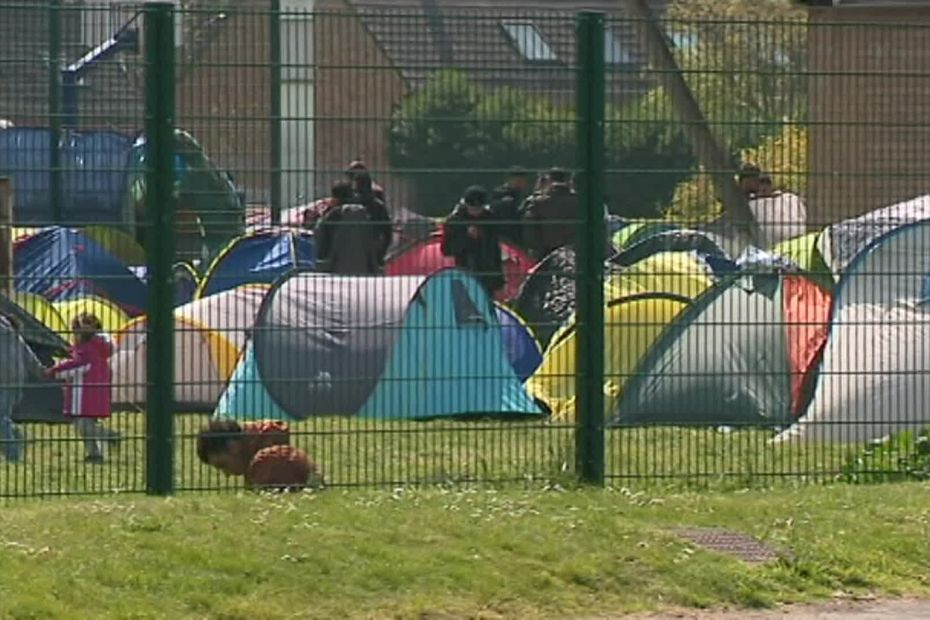Louis Le Franc, prefect of Pas-de-Calais, was sentenced for having led the evacuation of a migrant camp in Calais, in September 2020, outside of an adequate legal framework. A decision that satisfies local associations.
On September 29, 2020, nearly 800 migrants were expelled from the Virval area, in Calais. A major dismantling operation in the context of which the prefect of Pas-de-Calais was condemned for having freed himself from the judicial authority. A decision that calls into question the legal framework of many evictions according to the complainants.
“It’s a symbolic victory, reacted Marguerite Combes, coordinator of Utopia 56, one of the complainant associations. We hope that it will be able to set a precedent, in any case it will allow us to go further in our legal remedies.
The applicants, 11 exiles and eight associations for the defense of migrants – including Secours Catholique and the Auberge des Migrants – had summoned the prefect in December 2020. They asked that this “significant” evacuation of migrants be deemed “illegal”.
In its judgment of March 24, the court condemned the prefect for “assault”, reproaching him for having taken the initiative of the eviction, and temporarily deprived of liberty the occupants of the site, without an adequate legal framework. “The state does things that are illegal, and this conviction showed it publicly, is satisfied Pierre Roques, coordinator of the hostel for migrants. “It’s something we’ve been trying to demonstrate for years.” adds Marguerite Combes.
This decision undermines the recurrent use by the State to carry out evictions from migratory camps on the northern coast of the legal framework of “flagrancy” – applicable when an offense has been observed for less than 48 hours -, according to the plaintiffs’ lawyer, Me Eve Thieffry.
“The judge confirms that what the associations have been saying for years: that the prefect has no personal power to evacuate people on the coast and to move them under duress”, she commented. That “prohibits the process used by the prefecture”.
The prefect assured to have acted on the decision of the prosecutor, the day after the opening of an investigation in “flagrance” on the presence of 450 tents.
The court considers on the contrary that he acted on his own initiative, relying on a tweet from the Minister of the Interior Gérald Darmanin who said his “support for Prefecture 62” for the operation. As of March 30, 2022, this tweet no longer appears on the account of the tenant of Place Beauvau.
The prefectural press release then published also indicated that the tents had been set up since “Several weeks”while the importance of the means implemented – including 30 buses – confirmed an upstream organization. Marguerite Combes, present on the scene during this evacuation, remembers “a monumental operation, with a very, very large police force.”
“These elements contradict the hypothesis of the discovery of the offense the day before” evacuation, the Court noted. Gold, “the prefecture of Pas-de-Calais did not require any authorization from the administrative judge in order to proceed with the evacuation” as required for an operation outside the framework of flagrance.
In addition, the prefecture exceeded its prerogatives by temporarily depriving the freedom of migrants escorted to buses, under pressure from the police, ruled the court.
The presence of many police officers surrounding the exiles during this evacuation, the largest of this type since 2016, was “likely to constitute a constraint”, notes the court.
The applicants requested 5,000 euros in damages for each of the exiles and 1,000 euros per association. Unless appealed by the prefecture, a hearing must decide on May 23 of these damages.
At first instance on January 6, 2021, the Boulogne-sur-Mer court declared itself incompetent, the prefecture having requested referral to the administrative court. “The testimonies produced do not allow us to conclude that coercion was used during the sheltering phase”, had in particular judged the court.
The prefecture, which has 15 days to contest this judgment of the Court of Appeal of Douai, in the North, has not “no comment to make on this court decision”.
–

/cloudfront-us-east-1.images.arcpublishing.com/dmn/RT246XLWIB5AC2QHBJ6V4ATOCQ.jpg)
